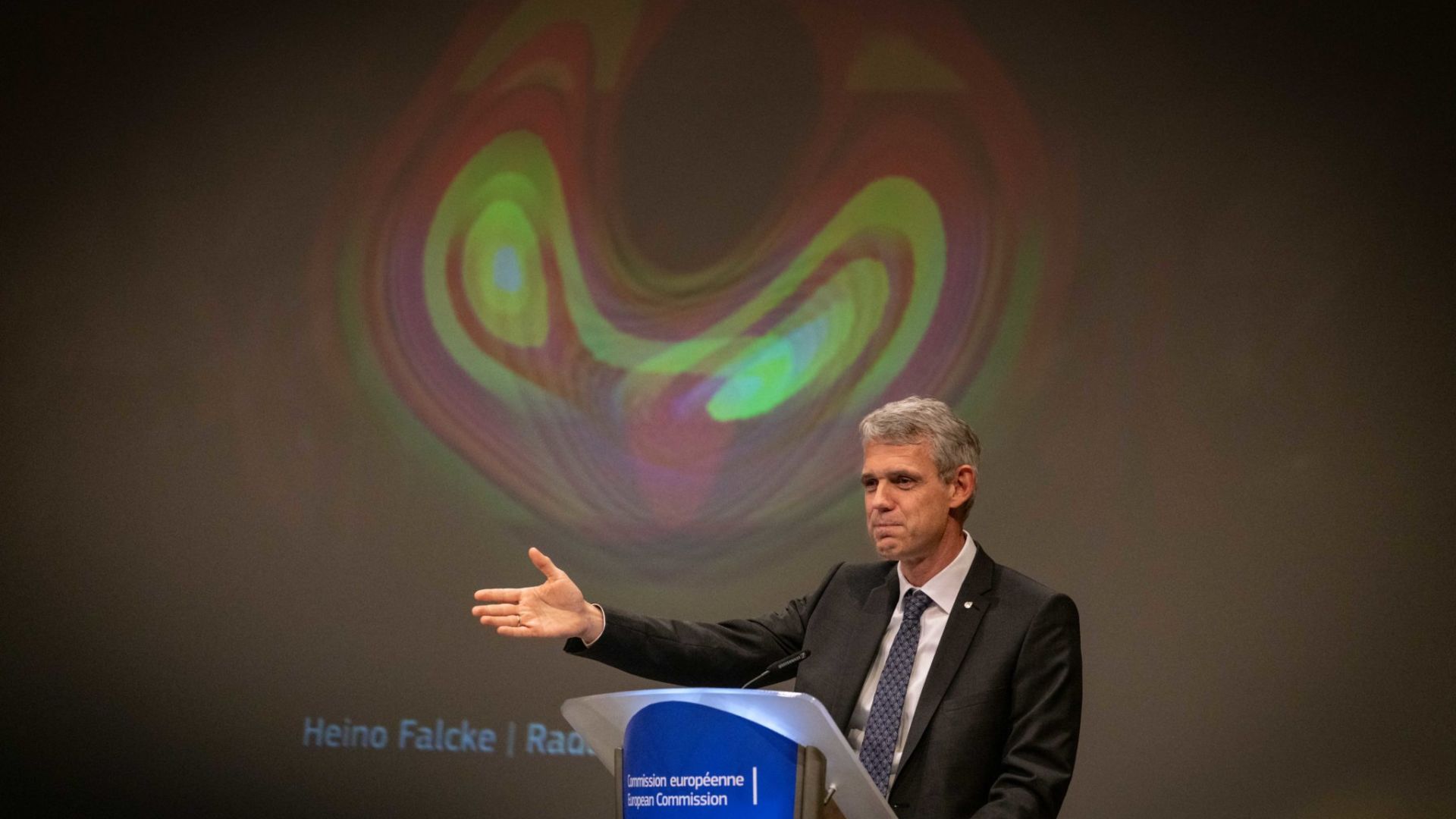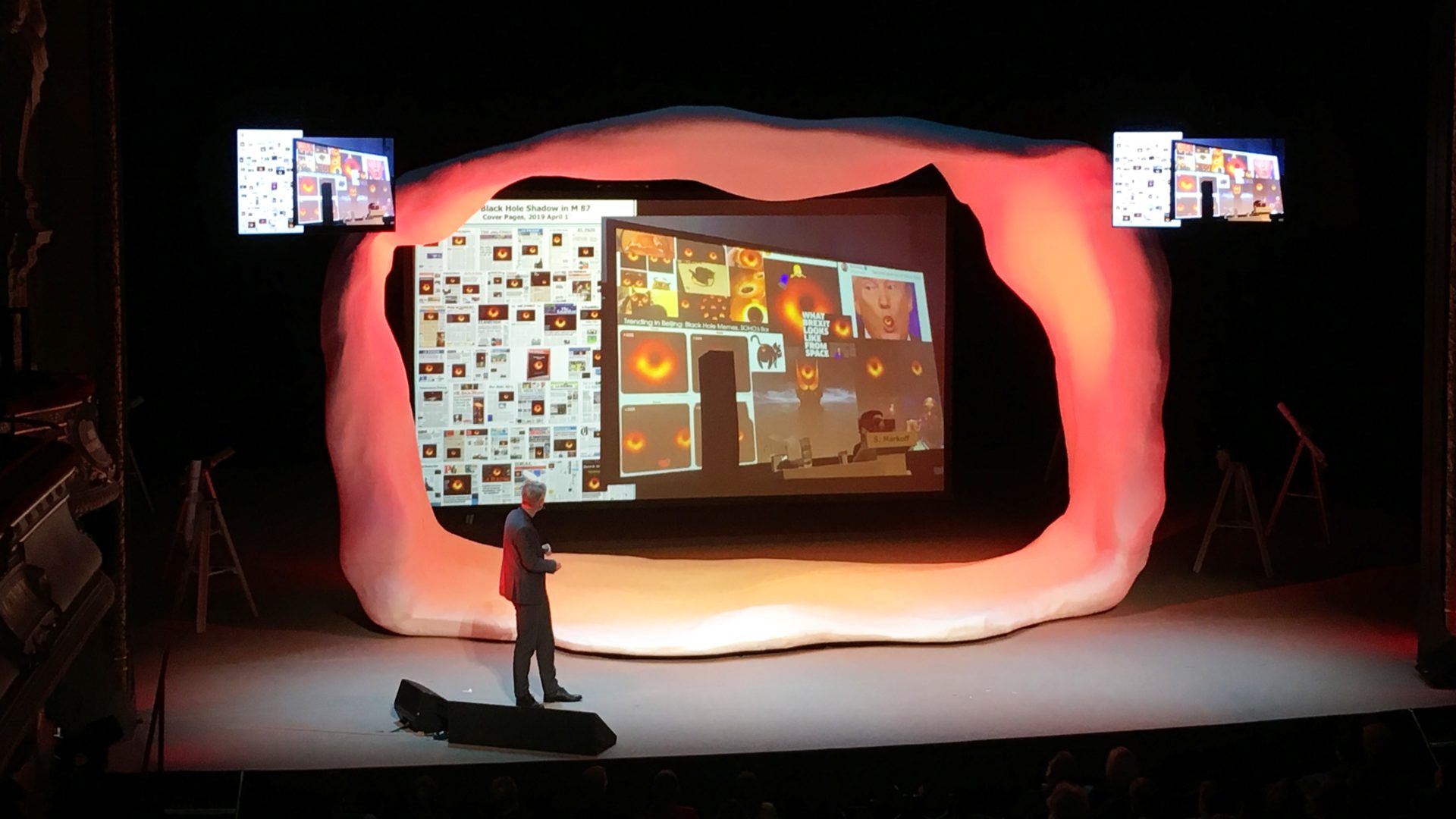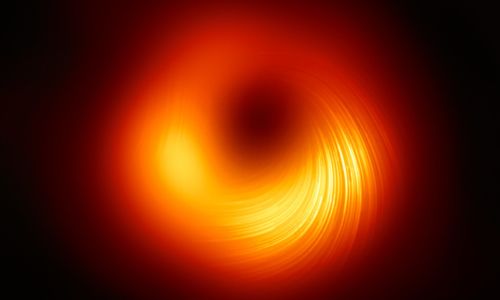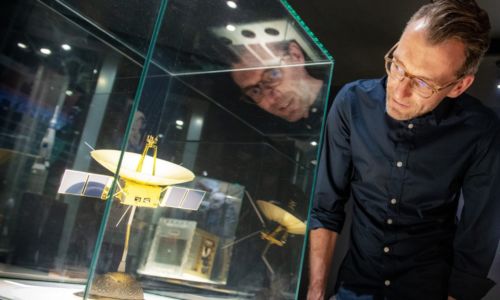Heino Falcke: ‘It is good that the university is investing in top research’
-
 Heino Falcke. © Erik van 't Hullenaar
Heino Falcke. © Erik van 't Hullenaar
The University is sticking its neck out by making 11.9 million euros available for Nijmegen’s black hole research, says Heino Falcke. His research group can now continue to play an internationally leading role. The investment will ultimately benefit the entire Radboud University, according to the astronomy professor.
An Erleichterung, astronomy professor Heino Falcke calls it, a relief. Radboud University announced today that it will guarantee almost 12 million euros for Falcke’s research group in the Huygens building over the next ten years. 1.9 million of that sum will go to the Africa Millimetre Telescope (AMT), a Nijmegen-led ambition to build a telescope in Namibia.
The other 10 million euros will be spread over just as many years. This is intended for personnel and other support for Falcke’s work on black holes within the Event Horizon Telescope (EHT), the international consortium that took the first image of a black hole in 2019 (see box).
Why is the University’s investment a relief?
‘It allows us to continue to play a leading international role in black hole research. I have my own permanent position in Nijmegen, but apart from that our group has little structural financing. We have to get the money through grants, but the short-term nature of those does not fit well with long-term experimental research of the calibre of the EHT. Two years ago, the NWO rejected a joint research proposal from the EHT, and another one this year. Fortunately, another proposal which we participated in has resulted in three PhD positions for the EHT consortium. But this is not enough to be able to contribute on a structural basis.’
‘Our research group had slowly emptied’
‘As a result, our research group has slowly emptied since 2019. Many of the people involved in the black hole photo have now moved abroad, to Harvard or New York. It makes me proud, but at the same time it is also necessary to attract new talent from outside. That is problematic at the moment.’
Isn’t that inherent in science? Sometimes you have rich years, sometimes lean ones.
‘That’s true. But we are one of the founders of the EHT team that took the photo. Responsibility comes with that. I’m also on the board. All thirteen EHT institutes contribute financially. The current contract for the EHT cooperation expires next year and a new phase of negotiations has just started. We have been saying for years that we will be running at full strength again soon, but we have to fulfil that promise one day. It is important to know that Nijmegen is one of the few institutes that does not manage its own telescope. That makes us less indispensable than, say, Harvard or the Max Planck Institute. Moreover, those institutions have grown. There are already discussions within the EHT about whether institutes with a telescope should have a bigger say.’
Black holes
Black holes are gigantic and massive cosmic objects that exert an extreme gravitational pull on their surroundings. So strong, in fact, that light – the fastest phenomenon in the universe at 300 thousand kilometres per second – cannot escape. Light that is just far enough away can still be perceived, however.
This was proven in 2019, when Heino Falcke (55) showed the world the very first photo of a black hole, on behalf of the EHT. The professor of Astroparticle Physics and Radio Astronomy became known to a wider audience all at once because of this feat. The orange-yellow image made front pages of newspapers worldwide. It was the result of a technical triumph in which seven radio telescopes from all over the world were linked together.
Besides a pretty picture, the photo was the first convincing evidence for the existence of supermassive holes and opened up new scientific avenues. For example, certain predictions made by Einstein can now be tested directly. Physicists hope that they can now also answer other big open questions in physics, such as how to connect quantum mechanics and the theory of relativity. This ‘Theory of Everything’ has been puzzling physicists for over for a century.
What can you promise now thanks to the money from the Executive Board?
‘Now, we can continue to support the core tasks of the EHT: assisting with black hole observations, analysing the data, and developing new instruments. These are technically very advanced devices through which we also contribute to technology development and innovation in the Netherlands. We can now hire people who will work at the interface between technology, science and business.’
‘We also want to invest money in developing a telescope in Namibia, the Africa Millimetre Telescope. Now that we can promise this, hopefully other parties will also invest. Their reasoning has been a bit like: if the University doesn’t believe in it, why should we?’
Why is an African telescope important?
‘There is still a gap in the global distribution of radio telescopes. There are observatories s in North and South America, and in Spain and France. But as Europe, we lack a counterpart in the southern hemisphere in the same time zone. With the AMT, we will be able to take both photos and videos of black holes: that is the plan.’
‘Ideally, the African telescope will run on green energy’
‘Apart from science, Western countries are also simply missing opportunities in Africa at the moment. For example, Namibia has very ambitious plans for education, research, green energy and hydrogen. We would like to work together on that. Ideally, the telescope there will run on green energy.’
What does Namibia gain from the telescope?
‘We already have a large network in Namibia. Marc Klein Wolt (director of the Radboud Radio Lab, ed.), who leads the technical side of the Africa project, has built up many contacts in recent years. At the government, NGOs, companies and UNAM, the University of Namibia. UNAM participates in the management of the telescope, the EHT will use it during some parts of the year.’

‘We will help train people in astrophysics at UNAM and fund the first African PhD project in astrophysics. Marc also does all kinds of educational activities in primary schools about astronomy. This also fits with Radboud University’s ambition to contribute to a better world, a goal I endorse.’
In any case, 11.9 million euros is a lot.
‘We don’t receive the money unconditionally: it is a guarantee. Only when we find sufficient external financing for the entire AMT will we start spending that 1.9 million euros. This will become clear in 2022 or 2023, when a ‘critical design review’ of the project will take place.’
‘And those other millions will pay for themselves in a way, I hope. We want to use them as matching for scholarship applications. A lot of grants require that institutions add money themselves as well, which we can now do from this budget. My goal is to ultimately earn more money than was invested.’
Two years ago, many fellow scientists were outraged when the minister gave you 200,000 euros for science communication. Now, you have received sixty times as much, while additional investments are already being made in natural science research, for example via the ‘sector plan funds’. Couldn’t that money be better spent on, say, the humanities?
‘I know there are colleagues who are just as good: I understand if they are frustrated. But our research has also led to great international visibility for Radboud University. I am also aware of that responsibility as a figurehead. For example, I always make sure that Radboud University is mentioned when I appear in the media.’
‘We have also submitted proposals together with scientists within the humanities ‘
‘It may sound arrogant, but the photo of the black hole remains science history. And it’s not over yet. In science, a one-hit wonder is of no use. We now have to ensure that the measurements of black holes continue. Our quality is also recognised, which you can see in the awards that the EHT, and I myself, have received in recent years. This also holds for our PhD students: Sara Issaoun recently obtained her doctorate cum laude. She is now going to Harvard for five years, thanks to an Einstein-Hubble grant, the most important American fellowship in astronomy. It is good that the University wants to continue to invest in top research and innovation. In this way the important contribution of Radboud University remains visible, which ultimately benefits all of us. By the way, we have also submitted proposals together with academics within the humanities.’
Small consolation, one may say.
‘It would actually be nice if people were just happy and proud that this kind of research is taking place in the Netherlands. I think the real problem is that the Netherlands has a very low level of funding when it comes to science. I also see this as a signal from Radboud University that it is doing this. In the Netherlands, only 2.2% of the gross national product goes into research, the new German government coalition has just agreed to 3.5%. That is a big difference.’


